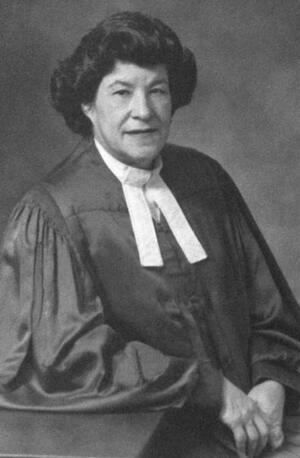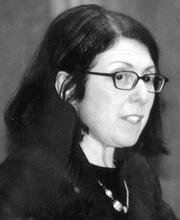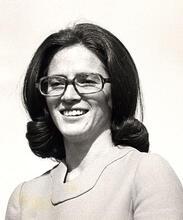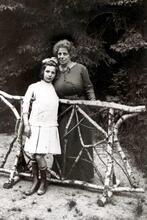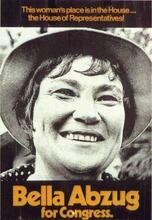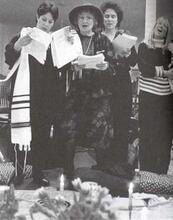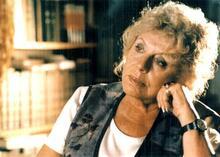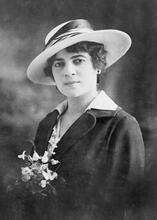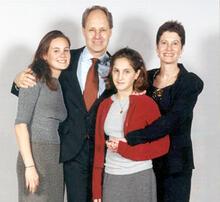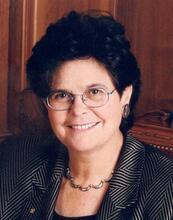Rita Charmatz Davidson
Maryland lawyer Rita Davidson's life (1928 – 1984) was a series of firsts in her state, among them: the first woman to be appointed appellate judge, the first to be elected judge of the court of special appeals, and the first to sit on the state's highest judicial body—the Maryland Court of Appeals.
Institution: Private collection.
Rita Charmatz Davidson’s career in the Maryland court system was a series of firsts, leading to her 1979 appointment as the first woman on the Maryland Court of Appeals. She served on the Montgomery County Board of Appeals from 1960 to 1964 and secretary of the Maryland Department of Employment and Social Services from 1970 to 1972, making her the first woman member of the governor’s cabinet. In 1972, she became the first woman judge on the Maryland Court of Special Appeals and in 1979, she was elevated to fill a vacancy on the Maryland Court of Appeals. She became known for her opposition to the death penalty, her defense of patients’ rights to medical information, and her support of women’s rights and child welfare.
Family and Education
Rita Charmatz Davidson led the vanguard for women in the state of Maryland, rising through the ranks of appointed local public service posts to the governor’s cabinet and seats on both of Maryland’s appellate courts.
A native of Brooklyn, New York, daughter of Michael and Eiga (Rokeach-Kochkovsky) Charmatz, Rita Charmatz Davidson attended local public schools. She had one older sister, Isabel Zackson. She attended Goucher College in Maryland and graduated with honors with a bachelor of arts degree in 1948. Thirty-one years later, Goucher conferred upon her an honorary doctor of laws degree. She graduated from Yale Law School in 1951 and was in private practice from 1951 through 1967 in Washington, D.C., and Montgomery County, Maryland.
Career
Davidson’s career in public service was a series of hard-earned firsts. After serving as a member of the Montgomery County Board of Appeals from 1960 to 1964, she was the first person appointed to hold the position of county zoning hearing examiner (1967–1970), a position created largely as a result of a landmark decision of the Maryland Court of Appeals in a case which she brought as counsel for a civic association. Then she was appointed secretary of the Maryland Department of Employment and Social Services, later renamed the Department of Human Resources (1970–1972). In that position, she was the first woman in Maryland to serve on the governor’s cabinet. In this post, her strong support of women’s rights and the welfare of children led to the establishment of the Commission on the Status of Women within her department.
In November 1972, Davidson was the first woman to be a Maryland appellate judge when she was appointed associate judge of the Maryland Court of Special Appeals. In November 1974, she held the highest elective office ever held by a woman in Maryland when she was elected judge of the court of special appeals. In January 1979, she was the first woman to sit on the Maryland Court of Appeals, the state’s highest judicial body, when she was elevated to fill an interim vacancy. Thereafter, in November 1980, Judge Davidson was elected to a ten-year term as judge of the court of appeals. Sadly, her career was cut short by cancer, and she died at age fifty-six, after serving only four years of her term.
While Davidson’s primary activities were based in the secular and political arena, she was affiliated with a Reform congregation and served on the board of directors of the Mid-Atlantic region of the Anti-Defamation League for a number of years in the late 1960s and early 1970s. Her mother, Eiga Rokeach-Kochkovsky Charmatz, was born into a distinguished Lithuanian family, with a line of rabbis and the founders of the Rokeach food manufacturing business on her paternal side. Her father’s family was from Latvia. Judge Davidson’s parents met in Russia and immigrated to the United States in the early 1920s. Once here, they did not participate actively in the Jewish community, but provided both Judge Davidson and her sister Hebrew tutoring at home.
On April 19, 1985, in a memorial tribute to Judge Davidson, Honorable Richard P. Gilbert, chief judge of the Maryland Court of Special Appeals, recalled that as an appellate judge, Rita Davidson “repeatedly demonstrated that she was not only a person of large intellect, but one of great compassion.... Any fair reading of the opinions signed Davidson, J., will lead to the obvious conclusion that Rita oftentimes marched to the beat of a different drum—her own. She established beyond doubt, through her writing and by her life, that she was philosophically a liberal, physically courageous, and mentally persistent.”
Davidson, David [husband of Rita Davidson]. Correspondence with author, February 18, 1996, and telephone conversation with author, June 5 and 13, 1997.
NYTimes, November 13, 1984, B6.
Thurlow, Katherine. “Profiles.” The Maryland Bar Journal (June 1986): 25.
“A Tribute to Judge Rita C. Davidson.” The Maryland Bar Journal (June 1986): 13.
WWWIA, 8.
Who’s Who of American Women (1972–1973): 200.

